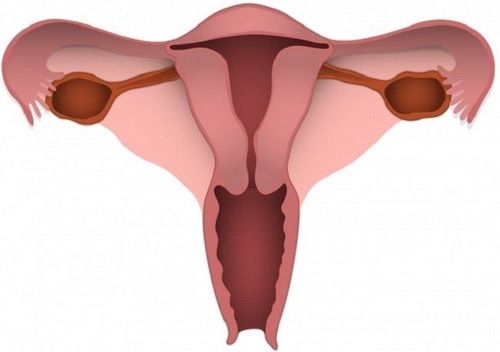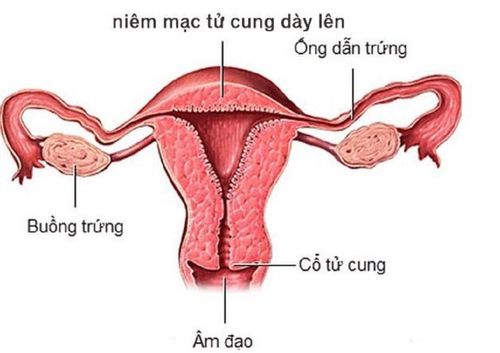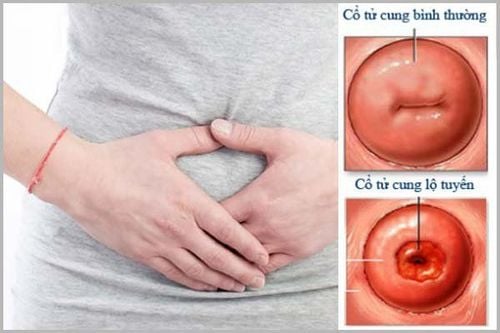This article was professionally consulted by Dr. Huynh Thi Hien, specialist level II, MD - Obstetrics and Gynecology Specialist - Department of Obstetrics and Gynecology - Vinmec Nha Trang International General Hospital
An endometrial lining that is either too thick or too thin can negatively impact a woman's fertility and increase the risk of infertility. So, how thick does the endometrium need to be to get pregnant?
1. What is the endometrium?
The endometrium, also known as the uterine lining, is a tissue layer that covers the entire inner surface of the uterus. This layer plays a crucial role in fertility and protects the pregnancy. Under the influence of the female sex hormone estrogen, the endometrial lining thickens throughout the menstrual cycle. A thickened endometrium is a sign that the uterus is preparing for a fertilized egg to implant.
On the other hand, if fertilization does not occur, this lining will shed and be expelled from the body, causing menstruation. If pregnancy does occur, the female hormone continues to thicken the lining to prepare for implantation.
The endometrium consists of two parts:
Basal layer: Composed of glandular epithelial cells and stromal tissue, unaffected by the menstrual cycle.
Functional layer: Strongly influenced by changes in the menstrual cycle.
Trắc nghiệm: Bạn có hiểu đúng về dấu hiệu mang thai sớm?
Các dấu hiệu mang thai sớm không phải chỉ mỗi trễ kinh mà còn có rất nhiều dấu hiệu khác như xuất huyết âm đạo, ngực căng tức,… Điểm xem bạn biết được bao nhiêu dấu hiệu mang thai sớm thông qua bài trắc nghiệm này nhé!
2. Endometrial thickness and its impact on fertility
2.1. Endometrium that is too thin
For women with an endometrial lining thinner than 8 mm, it can be difficult to conceive, specifically during the implantation process.
Even if implantation occurs, it can be challenging to maintain the pregnancy throughout its duration. This is because the thin endometrial lining is unable to provide adequate support for the embryo, leading to an increased risk of miscarriage or stillbirth.
2.2. Endometrium that is too thick
Women with an endometrial lining thicker than 20 mm are considered to have a thickened endometrium. This condition can also hinder fertility.
Excess estrogen production in the body stimulates the endometrial lining to thicken, interfering with the implantation process.
If estrogen levels are too high, women may experience irregular menstrual periods, secondary amenorrhea, polycystic ovary syndrome, and ovulatory disorders, all of which can impede fertility.

3. How thick does the endometrium need to be to get pregnant?
To determine the optimal endometrial thickness for pregnancy, women can refer to the following normal thickness ranges:
Immediately after menstruation: Endometrial thickness is between 3-4 mm.
Mid-cycle (around ovulation): Endometrial thickness is between 8-12 mm.
Premenstrual phase: Endometrial thickness increases to 12-16 mm. If fertilization does not occur, the lining will shed, resulting in menstruation.
4. Treating endometrial abnormalities to improve fertility
4.1. Thin endometrium
Thin endometrium can be caused by estrogen deficiency, endometrial damage from previous abortions, anemia, or endometrial hyperplasia. Depending on the underlying cause, your doctor will recommend the appropriate treatment.
4.2. Thick endometrium Endometrial
hyperplasia, causing the lining to thicken, is often seen in obese women, women with polycystic ovary syndrome, or those using estrogen-containing contraceptives without progesterone.
To treat thickened endometrium, doctors typically prescribe hormone therapy to restore the balance of estrogen and progesterone in the body, thereby increasing fertility.
If you notice any abnormalities in your fertility or menstrual cycle, consult a gynecologist for an evaluation and appropriate treatment.
For women planning to get pregnant, prenatal screening is the first step in preparing for a healthy pregnancy. Prenatal screening helps identify potential maternal and fetal health issues, allowing for early intervention.f
To arrange an appointment, please call HOTLINE or make your reservation directly HERE. You may also download the MyVinmec app to schedule appointments faster and manage your reservations more conveniently.















